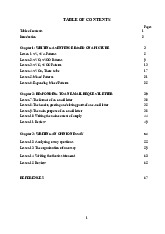




Preview text:
1. EDUCATION
Opinions about teaching national or international literature and history -
schools should focus on teaching national literature and history rather
than the literature and history of other countries -
children enjoy learning about where they live, and by studying the ideas,
culture and history of their own countries they begin to develop a sense of
identity (nhận thức về bản sắc) -
parents who study the same books and historical events can help their children with school work -
for example, all Vietnames children have school lessons related to the air
battle of Dien Bien Phu or Truyen Kieu which is Nguyen Du’s
masterpiece just as their parents did, and there is educational continuity
(sự tiếp nối) across the generations -
an emphasis on national literature and history gives educators a narrower
teaching scope (phạm vi dạy học) , making curriculum design an easier task -
the study of global events and foreign novels could cause unnecessary
difficulty and confusion for school pupils -
For example, it is unnecessary to present Chinese history to a Vietnamese
child who has not yet studied the history of his or her own country in detail -
the child will be more able to comprehend historical events that took
place in Ha Noi than those that happened in Beijing -
any exposure to international literature is likely to require the teaching of
a foreign language or the use of translations -
Young people at primary or secondary school age ( ở độ tuổi tiểu học /
trung học) are simply not ready for such complications
Opinions about homework -
school children should not be given homework -
homework is an unnecessary burden on children -
homework does nothing to improve educational outcomes -
Countries such as Finland, where school children are not given
homework, regularly top (đứng đầu) international educational league
tables (bảng xếp hạng giáo dục quốc tế) and outperform nations where
setting homework (việc giao bài tập) is the norm -
the school day is already long enough, and leaves their children too tired
to do further study when they return home -
play time is just as beneficial as study time from the perspective of brain development. -
homework has an important role to play in the schooling of children -
homework encourages independent learning and problem solving, as
children are challenged to work through tasks alone and at their own pace -
homework encourages students to apply the knowledge that they have learnt in the classroom -
For example, by doing mathematics exercises at home, students
consolidate their understanding of the concepts taught by their teacher at school -
it is important for children to develop an independent study habit because
this prepares them to work alone as adults
negatives of online cources -
Some universities now offer their courses on the Internet so that people can study online -
online courses are becoming a common feature of university education. -
Students may not have the opportunity to engage face-to-face with their
teachers, and will instead have to rely on written forms of communication. -
students who study online do not come into direct contact with each other,
and this could have a negative impact on peer support, discussion and exchange of ideas. -
For example, whereas students on traditional courses can attend seminars
and even discuss their subjects over coffee after lessons, online learners
are restricted to chatting through website forum areas -
These learners may also lack the motivation and element of competition
that face-to-face group work brings
Positives of online courses -
online university courses are a positive development -
online courses allow learners to study in a flexible way, meaning that they
can work whenever and wherever is convenient, and they can cover the material at their own pace -
the cost of a university education can be greatly reduced, while revenues
for institutions may increase as more students can be taught -
online learning offers open access to anybody who is willing to study,
regardless of age, location, ability and background
opinions about compulsory subjects -
universities should only offer subjects that will be useful in the future -
university courses like medicine, engineering and information technology
are more likely to be beneficial than certain art degrees -
From a personal perspective, these courses provide more job
opportunities, career progression, better salaries, and therefore an
improved quality of life for students who take them -
On the societal level, by forcing people to choose particular university
subjects, governments can ensure that any knowledge and skill gaps in the economy are covered -
a focus on technology in higher education could lead to new inventions,
economic growth, and greater future prosperity -
university students should be free to choose their preferred areas of study -
society will benefit more if our students are passionate about what they are learning -
nobody can really predict which areas of knowledge will be most useful
to society in the future, and it may be that employers begin to value
creative thinking skills above practical or technical skills and we would
need more students of art, history and philosophy than of science or technology
opinions about allowing ex-prisoners to speak to teenagers -
Some people who have been in prison become good citizens later -
allowing such people to speak to teenagers about their experiences is the
best way to discourage them from breaking the law (phạm luật) -
teenagers are more likely to accept advice from someone who can speak from experience -
Reformed offenders can tell young people about how they became
involved in crime, the dangers of a criminal lifestyle, and what life in prison is really like -
They can also dispel any ideas that teenagers may have about criminals leading glamorous lives -
The vivid and perhaps shocking nature of these stories is likely to have a powerful impact. -
The alternatives to using reformed criminals to educate teenagers about
crime would be much less effective -
police officers visit schools and talk to young people, which could be
useful in terms of informing teens about what happens to lawbreakers
when they are caught, but young people are often reluctant to take advice from figures of authority -
students would see teachers as credible sources of information about this topic -
educational films might be informative, but there would be no opportunity
for young people to interact and ask questions
opinions about requiring teenagers to do unpaid work -
Most young people are already under enough pressure with their studies,
without being given the added responsibility of working in their spare time -
School is just as demanding as a full-time job, and teachers expect their
students to do homework and exam revision on top of attending lessons every day -
When young people do have some free time, we should encourage them
to enjoy it with their friends or to spend it doing sports and other leisure activities -
They have many years of work ahead of them when they finish their studies -
it goes against the values of a free and fair society to force a group of
people to do something against their will -
Doing this can only lead to resentment amongst young people, who would
feel that they were being used, and parents, who would not want to be told how to raise their children -
Currently, nobody is forced to volunteer, and this is surely the best system
Opinions about accepting equal numbers of male and female students in university subjects. -
Having the same number of men and women on all degree courses is simply unrealistic -
Student numbers on any course depend on the applications that the institution receives -
If a university decided to fill courses with equal numbers of males and
females, it would need enough applicants of each gender -
In reality, many courses are more popular with one gender than the other,
and it would not be practical to aim for equal proportions -
For example, nursing courses tend to attract more female applicants, and
it would be difficult to fill these courses if fifty per cent of the places needed to go to males -
it would be unfair to base admission to university courses on gender -
Universities should continue to select the best candidates for each course
according to their qualifications -
In this way, both men and women have the same opportunities, and
applicants know that they will be successful if they work hard to achieve good grades at school -
If a female student is the best candidate for a place on a course, it is surely
wrong to reject her in favour of a male student with lower grades or fewer qualifications.
Benefits of studying at university -
it is beneficial for students to study at university -
academic qualifications are required in many professions -
For example, it is impossible to become a doctor, teacher or lawyer
without having the relevant degree -
university graduates have access to more and better job opportunities, and
they tend to earn higher salaries than those with fewer qualifications -
the job market is becoming increasingly competitive, and sometimes there
are hundreds of applicants for one position in a company -
Young people who do not have qualifications from a university or college will not be able to compete
Opinions about studying the science of food and how to prepare it at school -
It is not a good idea to add culinary courses in students’ timetable -
If learing about nutrition and food preparation became compulsory at
school, hours to study academic shubjects would be sacrified -
Students should only attend classes, such as maths, literature, language,
etc which provide young people with the foundational knowledge to
prepare them for future career prospects -
These subjects also offer superior job opportunities, more lucrative
salaries and therefore an improved quality of life, rather than those related to cooking -
Knowledge about food and cooking recipes are already available on the
Internet, students can acquire them quickly without joining classes
Benefits of studying abroad -
Foreign institutions may offer better courses. -
Many students want to attend a prestigious university. -
The best universities employ teachers who are experts in their fields. -
Qualifications gained abroad can open the door to better job opportunities. -
Living abroad can broaden students’ horizons. -
Overseas students are exposed to different cultures and customs. - They become more independent. -
They are responsible for cooking, cleaning and paying bills. -
They will learn a foreign language
Drawbacks of studying abroad -
Living and studying abroad can be difficult. -
Students have problems with paperwork such as visa applications. -
The language barrier can be a problem. -
Students have to find accommodation and pay bills. -
Studying in a foreign language is challenging. -
Living alone in an unfamiliar culture can cause homesickness.




